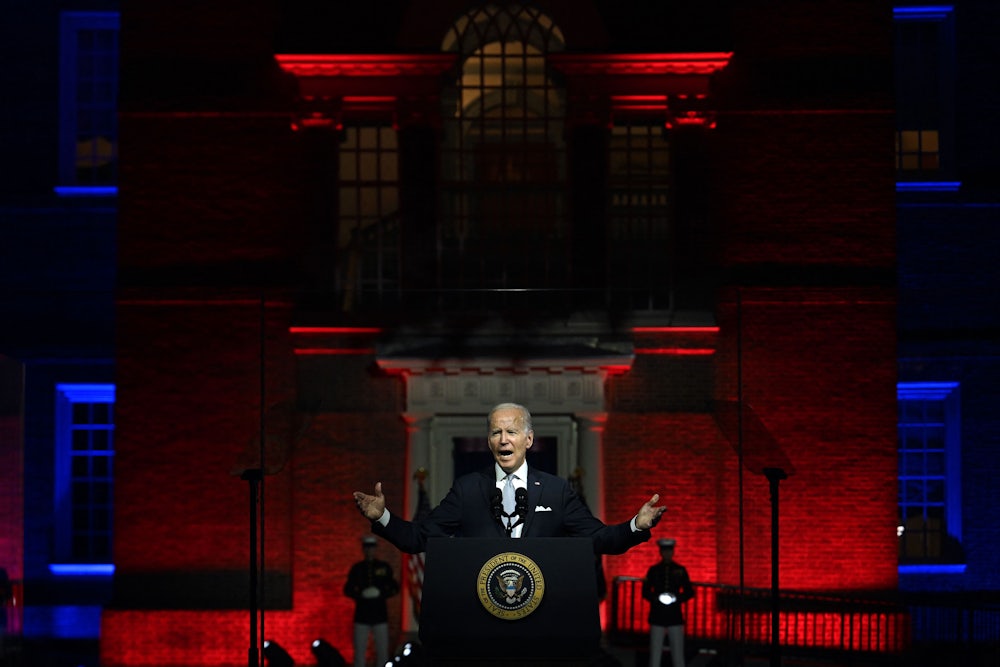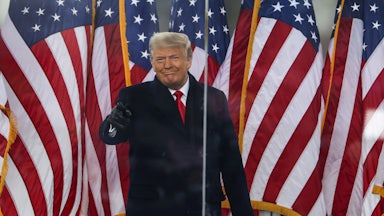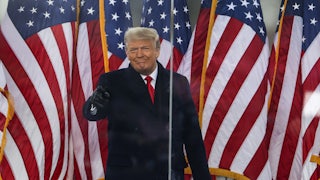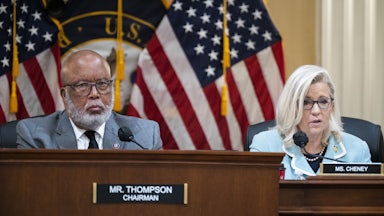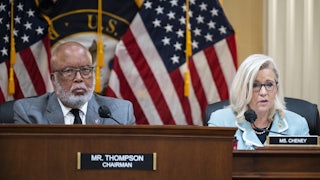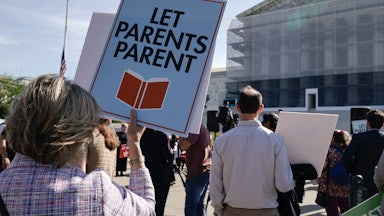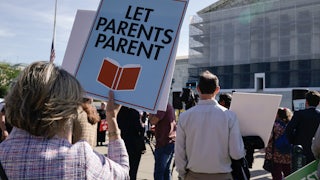On Thursday, President Biden delivered a searing speech about the threat to democracy posed by Donald Trump—whose name he mentioned only twice—and the growing ranks of “MAGA Republicans.” These are forces that “threaten the very foundations of our republic,” Biden said. The president delivered this oration in front of Philadelphia’s Independence Hall, with red light drenching the backdrop, giving the event the look of a Dario Argento film—or rejected set dressing for a King Crimson tour. But Biden aimed for higher stakes: He characterized the upcoming midterm elections as nothing less than a “battle for the soul of the nation.”
The context for his speech was not particularly complicated or difficult to understand. Less than two years ago, then-President Trump did everything he could to overturn a lawful and legitimate election—and nearly succeeded. When he failed, he implored his followers to “fight like hell” in a last-ditch effort to delay the certification of that election. They did—and for a time brought violence inside the halls of power. Several people died during the resulting melee; several high-ranking government officials, including then-Vice President Mike Pence, only narrowly avoided the mob. In the wake of that assault, Trump has not only maintained the support of the vast majority of his party, Republicans across the country have enacted strict voter-suppression measures and nominated candidates committed to overturning any election won by a Democrat. This week, Trump promised those who stormed the Capitol a presidential pardon and an apology from a (presumably GOP-controlled) government.
With the midterm elections less than three months away, the Democratic message is—rather unsurprisingly—equally uncomplicated and understandable: It’s focused on protecting democracy from a party that keeps promising political violence. Biden’s speech, delivered just before Labor Day, served as a kind of grace note to the midterm season. It was an existential speech in that the fate of American democracy does actually seem to be on the ballot. And, yes, it was a political speech in that the Democrats are pledging to preserve democracy while Republicans plot to overthrow the Founders’ ideals in favor of something in Viktor Orbán’s image.
Unsurprisingly, many in the political press were shocked—shocked!—to find politics in Biden’s speech. Shortly after the speech began, NPR White House correspondent Asma Khalid tweeted, “This is clearly a political, campaign speech. It’s clear who/what this speech is about. In the first 3 minutes, President Biden said Donald Trump—by name—twice.” Wowza, what a scoop! Several journalists were horrified that there were Marines as part of the backdrop of the speech. “Whatever you think of this speech, the military is supposed to be apolitical,” tweeted CNN anchor Brianna Keilar. “Positioning Marines in uniform behind President Biden for a political speech flies in the face of that. It’s wrong when Democrats do it. It’s wrong when Republicans do it.”
As Columbia Journalism Review’s Jon Allsop noted, The New York Times did acknowledge that the United States is facing an unprecedented threat from a political party—eventually. Forty-one paragraphs into a 44-paragraph story, the paper of record quoted University of Virginia historian Allida Black—“We are in a crisis in this country. There’s no doubt about it. Not just in terms of the sanctity of the vote or trusting our votes will be counted”—but not before allowing several Republicans to absolutely piss their pants over Biden’s accurate description of their current political project.
From the beginnings of his presidential campaign, Biden has endeavored to be as solicitous as possible to the Republican Party, or at least his recollections of it. He was true to form even in this speech. Anyone watching could note his careful needle-threading—evidenced by the repetition of “MAGA Republicans”—and insistence on not labeling every Republican, or even every Trump voter, a fascist or “semi-fascist.” Early on, Biden drew a bright line: “I want to be very clear, very clear up front. Not every Republican, not even the majority of Republicans, are MAGA Republicans. Not every Republican embraces their extreme ideology.” Republicans, eager for a new “basket of deplorables” moment, disregarded this and instead have been throwing a temper tantrum for 18 hours, as if they—to say nothing of Donald Trump—have not spent the last decades labeling every Democrat a Communist or a terrorist, bent on turning the U.S. into Khmer Rouge–era Cambodia.
That Biden’s speech was political served as an excuse for lazy both-sides journalism, as reporters scrambled after the nearest bottle of weak sauce to draw equivalence between Biden’s commentary and a movement that’s currently calling in bomb threats to children’s hospitals. Biden was quoted laying out an argument—with evidence—that Republicans were bent on subverting democracy. Republicans such as Kevin McCarthy were then permitted to respond that, actually, Joe Biden was the real authoritarian. (Marjorie Taylor Greene took it further, as she is wont to do, tweeting that Biden was Hitler.) Surely objective reporters can weigh the evidence of these claims and come up with an answer.
Others, particularly in the anti-anti-Trump set, instead pissed and moaned about how Biden wasn’t being “unifying.” How can you try to unite with those who are bent on destroying democracy? Where do you “meet in the middle” with a party that, since the 2020 election, has embarked on a nationwide campaign to suppress the vote? You can’t. But this take also ignores that Biden did include several olive branches to Republicans concerned about the tilt toward the authoritarian.
The mainstream press has long struggled with these issues. Nowhere is this clearer than at CNN, which is currently in the midst of a purge of anyone who acknowledges the basic truth—that Trump and his followers are anti-democratic—in a foolhardy effort to win back MAGA voters who detest the mainstream media. (Longtime White House correspondent John Harwood is the latest network veteran to be let go since the network came under the stewardship of John Malone; his sacking occurred within hours of him offering commentary on CNN that “the core point [Biden] made in that political speech about the threat to democracy is true.”)
But CNN is hardly alone. The Beltway press has struggled to cope with the rise of a political party that is pursuing an existential threat to democracy. They hate the idea that they actually bear some responsibility for preventing autocracy; indeed that their own profession relies on this defense of our institutions. This neurosis drives them, endlessly, back into a blind spot they’ve built for themselves, in which everything is strictly politics as usual, and the question of whether America’s multiracial democracy should actually survive the decade is just an interesting debate that can be bemusedly enjoyed. There are plenty of normal political issues at stake in the midterms—inflation, crime, the war in Ukraine—to which they can apply their preferred rubric. The GOP’s threat to the republic isn’t one of them.
